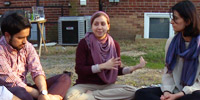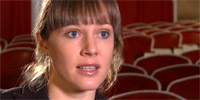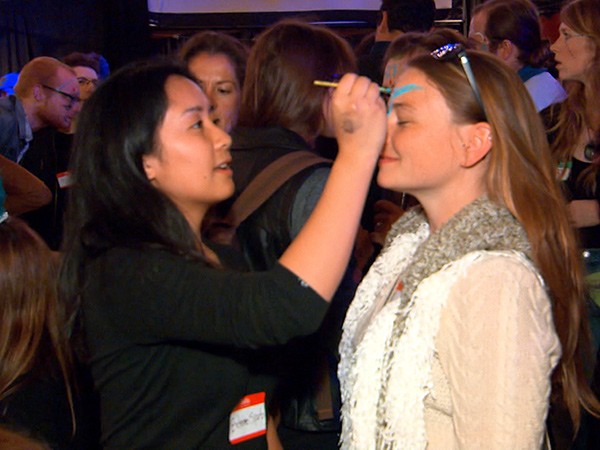 KIM LAWTON, correspondent: It’s Friday night in San Francisco. These people are heading for a lively night on the town. And they are doing something many would find unthinkable: they’re checking their phones at the door. This is the National Day of Unplugging, launched seven years ago by the Jewish nonprofit group Reboot. The goal is to encourage people to take a break from technology and find other ways to entertain themselves. For many, that’s easier said than done.
KIM LAWTON, correspondent: It’s Friday night in San Francisco. These people are heading for a lively night on the town. And they are doing something many would find unthinkable: they’re checking their phones at the door. This is the National Day of Unplugging, launched seven years ago by the Jewish nonprofit group Reboot. The goal is to encourage people to take a break from technology and find other ways to entertain themselves. For many, that’s easier said than done.
CYNTHIA AHR: If I leave my phone, I feel like I’m driving a car without a seat belt. I never know what’s going to happen.
SHANNON KELEHER: I check my email all the time. I was doing it before.
KYLE BALLARD: She was. We were at a bar, and she was checking her email from work at 7:30 at night on a Friday. So this is good. It’s just an excuse to leave the phone behind.
ABI KOH: It’s like a security blanket in a way for me. If I don’t have it when I go out the door from home, I kind of feel vulnerable.
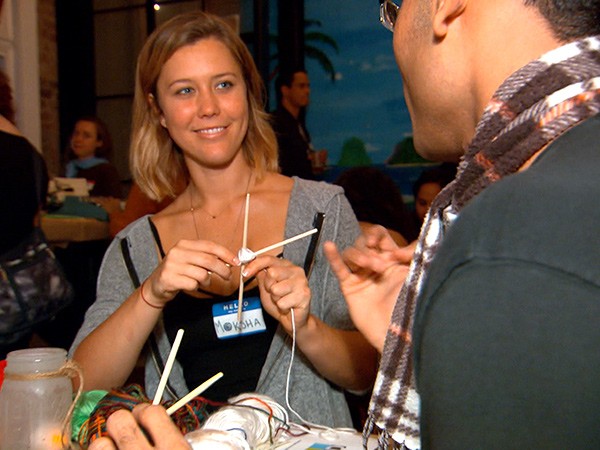 KAY DELGADO: There was a time when you would go out and not know what happens in the world for that time you went, so why has that changed? I guess we’re just addicted to the constant stream of I’m knowing what’s happening at all times.
KAY DELGADO: There was a time when you would go out and not know what happens in the world for that time you went, so why has that changed? I guess we’re just addicted to the constant stream of I’m knowing what’s happening at all times.
LAWTON: At National Day of Unplugging events like this one, people have fun doing non-digital activities, from knitting and coloring to writing notes the old-fashioned way. There’s face painting, live music, and even a photo booth.
TANYA SCHEVITZ (Reboot National Communications and San Francisco Programs Manager): We ask people to think about what they like to do when they’re unplugged. So many people say, “I can never put down my cellphone, I wouldn’t be able to live without it.” But in reality there are so many things that we like to do when we are unplugged.
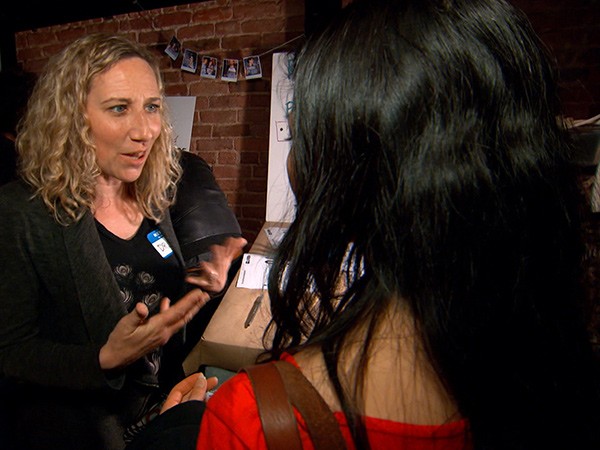 LAWTON: Reboot spokesperson Tanya Schevitz says it’s not anti-technology, but rather urging people to find a better balance in how they use technology. She says the concept comes from the Jewish Sabbath, Shabbat, a regular time set aside for rest.
LAWTON: Reboot spokesperson Tanya Schevitz says it’s not anti-technology, but rather urging people to find a better balance in how they use technology. She says the concept comes from the Jewish Sabbath, Shabbat, a regular time set aside for rest.
SCHEVITZ: It’s ancient wisdom that’s ever more important right now in our hyper-connected world, in a world where we are on 24/7, where there is an expectation that you can be reached and will respond to every buzz, beep, vibration, and ping of your phone or your digital devices, so I think it’s needed more than ever, really.
LAWTON: Americans are increasingly dependent on their digital devices. According to the Pew Research Center, 92 percent of US adults own cellphones, and almost 70 percent of those are smartphones. About three-quarters of Americans own a computer, and nearly half own some kind of tablet. While this has undeniable benefits, many analysts say the negative impact must also be addressed.
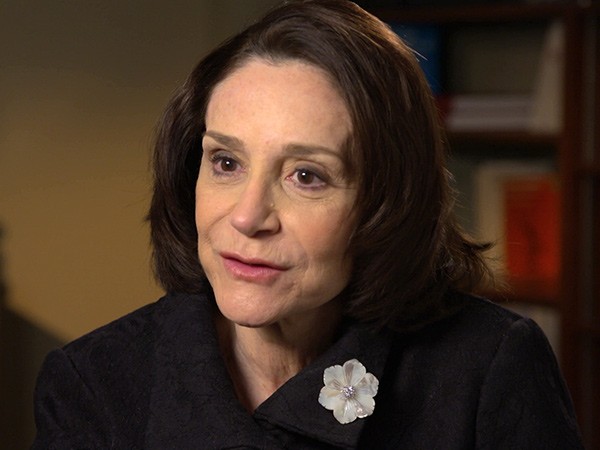 PROFESSOR SHERRY TURKLE (Professor of the Social Studies of Science and Technology and Director, Initiative on Technology and Self, Massachusetts Institute of Technology): The latest studies shows that 89 percent of Americans took out a phone during their last social interaction, and 82 percent say that “it deteriorated the conversation.” That’s my concern, that we are deteriorating our presence and in-person presence.
PROFESSOR SHERRY TURKLE (Professor of the Social Studies of Science and Technology and Director, Initiative on Technology and Self, Massachusetts Institute of Technology): The latest studies shows that 89 percent of Americans took out a phone during their last social interaction, and 82 percent say that “it deteriorated the conversation.” That’s my concern, that we are deteriorating our presence and in-person presence.
LAWTON: Psychologist and Massachusetts Institute of Technology professor Sherry Turkle is author of Reclaiming Conversation: The Power of Talk in a Digital Age. She argues that the near-constant distractions of technology can harm many aspects of relationships.
PROFESSOR TURKLE: All the things that we get out of conversation—intimacy, empathy, our ability to connect with other people and know them and form relationships, because we are always elsewhere in some way at the same time.
LAWTON: She argues that a deterioration of personal connections has troubling consequences for the entire society.
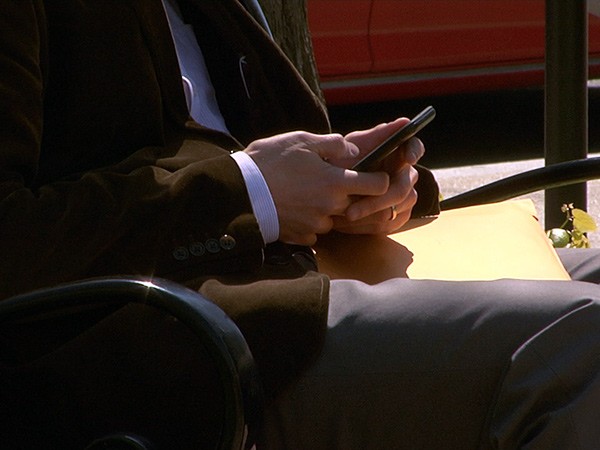 PROFESSOR TURKLE: When something becomes the social norm, we become desensitized. We say that’s just the way it is. But that doesn’t mean that it doesn’t do its damage, and it’s particularly damaging to young people, to the children that we’re raising.
PROFESSOR TURKLE: When something becomes the social norm, we become desensitized. We say that’s just the way it is. But that doesn’t mean that it doesn’t do its damage, and it’s particularly damaging to young people, to the children that we’re raising.
LAWTON: In his recent document on the family, Pope Francis also noted that technology can hurt families such as “when at dinnertime everyone is surfing on a mobile phone, or when one spouse falls asleep waiting for the other, who spends hours playing with an electronic device.”
LAWTON: For the National Day of Unplugging, Tanya Schevitz organizes non-digital events for adults and children as well. She says she was taken aback by one recent interaction with a father.
SCHEVITZ: He said “Oh, my gosh, we really need this,” and he turned to his daughter who was about five and said, “Who is mommy’s best friend?” And without hesitation, this little girl said, “Her cellphone.” My gosh, that is heartbreaking. I wouldn’t want my kids saying that.
LAWTON: Still, Schevitz admits unplugging is something that she struggles with as well. She puts her phone away when she picks up her kids from school and tries not to be on it again until they go to bed.
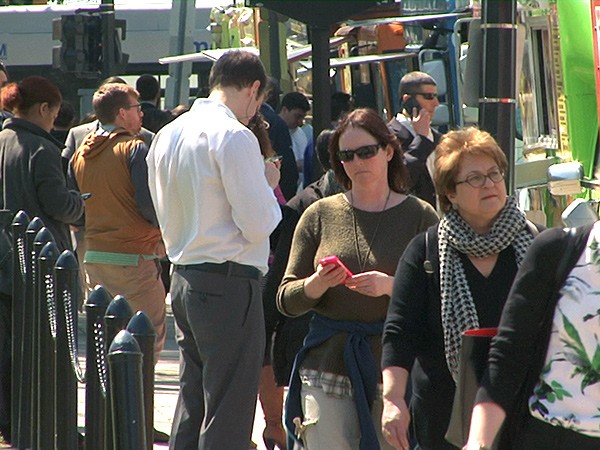 SCHEVITZ: They know that they are going to get my attention. When I pick them up from school, I’m not going to be half-listening or going to be glancing at my phone or checking Facebook. They know that I’m going to listen to what they have to say, that I’m going to play with them.
SCHEVITZ: They know that they are going to get my attention. When I pick them up from school, I’m not going to be half-listening or going to be glancing at my phone or checking Facebook. They know that I’m going to listen to what they have to say, that I’m going to play with them.
LAWTON: Many experts are also concerned that people use digital devices as a way to avoid being alone with their thoughts.
PROFESSOR TURKLE: You can see that anxiety about being alone, when you look at people in a checkout line in a supermarket, when I study people at stop signs. They are supposed to wait four seconds; in three seconds they are checking their texts.
LAWTON: As a Zen master and guiding teacher at the Cambridge Zen Center http://www.cambridgezen.com/ in Massachusetts, Jane Dobisz believes there are great spiritual benefits to being still and being in the present moment. She finds help in the ancient Buddhist practice of meditation.
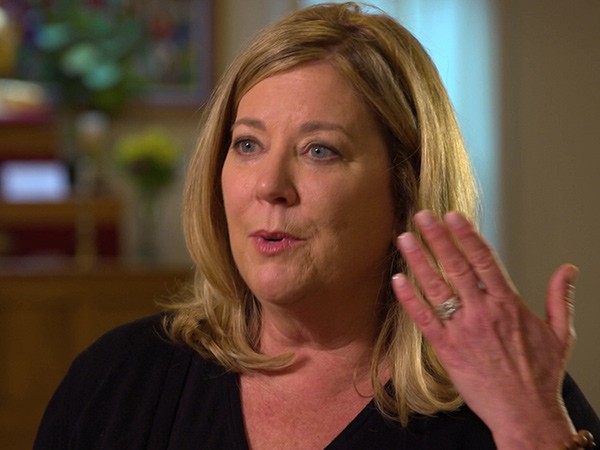 JANE DOBISZ (Zen Master, Cambridge Zen Center): That’s what meditation addresses, is that this moment is so rich, it’s so wonderful if you could just stop running away from it. Take a breath, take a rest, settle into the moment. Then hear the sound of the bird, feel the wind on your cheeks, smell the flower, feel your body. Feel your heart.
JANE DOBISZ (Zen Master, Cambridge Zen Center): That’s what meditation addresses, is that this moment is so rich, it’s so wonderful if you could just stop running away from it. Take a breath, take a rest, settle into the moment. Then hear the sound of the bird, feel the wind on your cheeks, smell the flower, feel your body. Feel your heart.
LAWTON: Dobisz leads device-free meditation retreats for college students.
DOBISZ: They are told in the beginning of the day no phones. And you can’t check your phone during the break or anything. And they are so happy at the end of that day, it’s just 9 to 3, and it’s not like a huge commitment. They are so happy.
LAWTON: She says they are amazed at their heightened awareness of the world around them.
DOBISZ: And it’s a revelation for them that they could see the flower, because you can’t see the flower. If you’re doing this [texting].
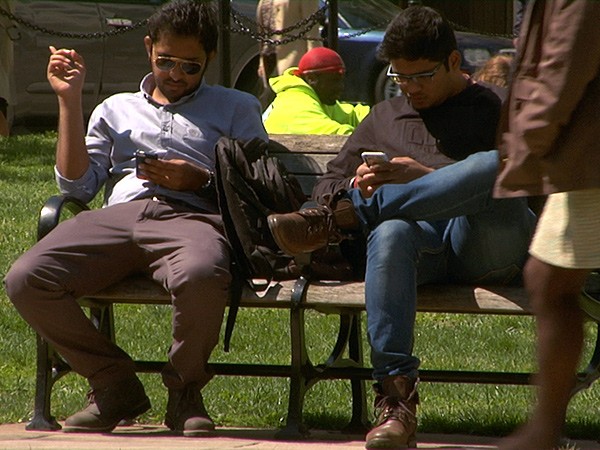 PROFESSOR TURKLE: I feel that we’re at a moment where we’ve adopted a new technology. We’ve been vulnerable to its seduction, and we’re also ready to say this has led us not to a good place in terms of how it’s affected our relationships. It’s time for a change.
PROFESSOR TURKLE: I feel that we’re at a moment where we’ve adopted a new technology. We’ve been vulnerable to its seduction, and we’re also ready to say this has led us not to a good place in terms of how it’s affected our relationships. It’s time for a change.
LAWTON: Professor Turkle says one of society’s ethical priorities should be carving out what she calls sacred spaces, where conversation and relationships are given more importance than technology.
PROFESSOR TURKLE: Empathy is at stake, and we need empathy to raise children who are able to be ethical and moral people.
LAWTON: But given the new digital gadgets flooding the market, the challenges to doing that may only get greater.
I’m Kim Lawton reporting.

 KIM LAWTON, correspondent: It’s Friday night in San Francisco. These people are heading for a lively night on the town. And they are doing something many would find unthinkable: they’re checking their phones at the door. This is
KIM LAWTON, correspondent: It’s Friday night in San Francisco. These people are heading for a lively night on the town. And they are doing something many would find unthinkable: they’re checking their phones at the door. This is  KAY DELGADO: There was a time when you would go out and not know what happens in the world for that time you went, so why has that changed? I guess we’re just addicted to the constant stream of I’m knowing what’s happening at all times.
KAY DELGADO: There was a time when you would go out and not know what happens in the world for that time you went, so why has that changed? I guess we’re just addicted to the constant stream of I’m knowing what’s happening at all times. LAWTON:
LAWTON:  PROFESSOR SHERRY TURKLE (Professor of the Social Studies of Science and Technology and Director, Initiative on Technology and Self, Massachusetts Institute of Technology): The latest studies shows that 89 percent of Americans took out a phone during their last social interaction, and 82 percent say that “it deteriorated the conversation.” That’s my concern, that we are deteriorating our presence and in-person presence.
PROFESSOR SHERRY TURKLE (Professor of the Social Studies of Science and Technology and Director, Initiative on Technology and Self, Massachusetts Institute of Technology): The latest studies shows that 89 percent of Americans took out a phone during their last social interaction, and 82 percent say that “it deteriorated the conversation.” That’s my concern, that we are deteriorating our presence and in-person presence. PROFESSOR TURKLE: When something becomes the social norm, we become desensitized. We say that’s just the way it is. But that doesn’t mean that it doesn’t do its damage, and it’s particularly damaging to young people, to the children that we’re raising.
PROFESSOR TURKLE: When something becomes the social norm, we become desensitized. We say that’s just the way it is. But that doesn’t mean that it doesn’t do its damage, and it’s particularly damaging to young people, to the children that we’re raising. SCHEVITZ: They know that they are going to get my attention. When I pick them up from school, I’m not going to be half-listening or going to be glancing at my phone or checking Facebook. They know that I’m going to listen to what they have to say, that I’m going to play with them.
SCHEVITZ: They know that they are going to get my attention. When I pick them up from school, I’m not going to be half-listening or going to be glancing at my phone or checking Facebook. They know that I’m going to listen to what they have to say, that I’m going to play with them. JANE DOBISZ (Zen Master, Cambridge Zen Center): That’s what meditation addresses, is that this moment is so rich, it’s so wonderful if you could just stop running away from it. Take a breath, take a rest, settle into the moment. Then hear the sound of the bird, feel the wind on your cheeks, smell the flower, feel your body. Feel your heart.
JANE DOBISZ (Zen Master, Cambridge Zen Center): That’s what meditation addresses, is that this moment is so rich, it’s so wonderful if you could just stop running away from it. Take a breath, take a rest, settle into the moment. Then hear the sound of the bird, feel the wind on your cheeks, smell the flower, feel your body. Feel your heart. PROFESSOR TURKLE: I feel that we’re at a moment where we’ve adopted a new technology. We’ve been vulnerable to its seduction, and we’re also ready to say this has led us not to a good place in terms of how it’s affected our relationships. It’s time for a change.
PROFESSOR TURKLE: I feel that we’re at a moment where we’ve adopted a new technology. We’ve been vulnerable to its seduction, and we’re also ready to say this has led us not to a good place in terms of how it’s affected our relationships. It’s time for a change.

